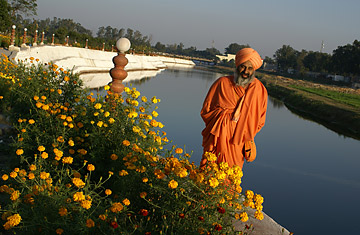
One of Balbir Singh Seechewal's favorite verses from the Granth Sahib, the Sikh holy book, venerates the elements. "The wind is our guru," it reads, "water is father, and the earth, mother." But four decades after the Green Revolution dramatically boosted India's agricultural production and made Punjab the nation's breadbasket, the state's once bountiful rivers and aquifers are depleted and polluted, thanks to the ever growing demands on groundwater, and the industrial and agricultural chemicals and raw effluent that find their way into local water sources.
Take the Kali Bein, a 99-mile-long (160 km) river considered sacred by the state's majority Sikh population. Over the past couple of decades it was reduced to a filthy drain into which six towns and more than 40 villages emptied their waste. Parts of the river dried up, leaving neighboring farmlands parched. Its polluted waters also seeped underground, contaminating the groundwater and causing lethal diseases.
In 2000, Seechewal, a Sikh holy man, set out to clean up this mess. Drawing on the Sikh tradition of kar sewa (voluntary service) he and his followers taught locals why they should clean the Kali Bein, enlisting volunteers to do the physical work and raising funds for equipment. At the height of his movement, people from more than two dozen villages were pitching in. The scale of the task was gigantic — volunteers cleared the entire riverbed of water hyacinth and silt, and built riverbanks and roads alongside the river. When appeals to government and municipal bodies failed to stop dirty water flowing into the river, Seechewal launched a public-awareness campaign to encourage villagers to dispose of their sewage elsewhere. Some villages revived traditional methods of waste disposal and treatment, and farmers lined up for a share of the treated water. A government order to divert water from a nearby canal was eventually obtained. As the riverbed was cleared, natural springs revived and the river began to fill up. Since then, trees have been planted along its banks and fishing has been banned to preserve biodiversity.
Today, the Kali Bein is thriving. Families head there for picnics and the devout bathe during religious festivals. Seechewal has turned his sights onto the tanneries and other factories that dispose of untreated waste in rivers. He is also leading efforts to get residents and the government to clean up rivers and creeks in a more systematic way across the state. "We have proved that it is possible to restore our rivers to a pristine condition if we all come together," says Seechewal. "It is time to do that on a bigger scale."